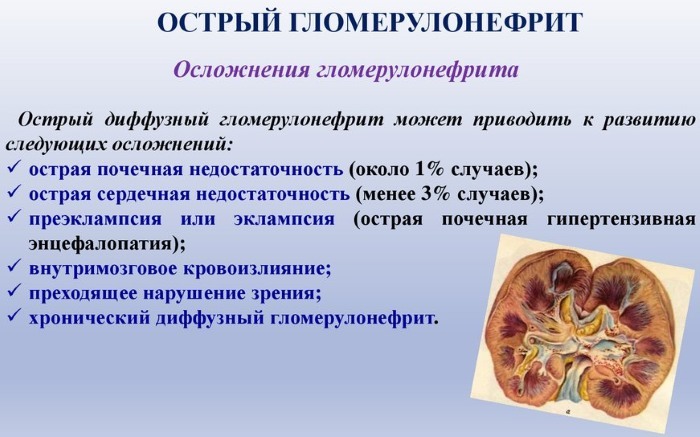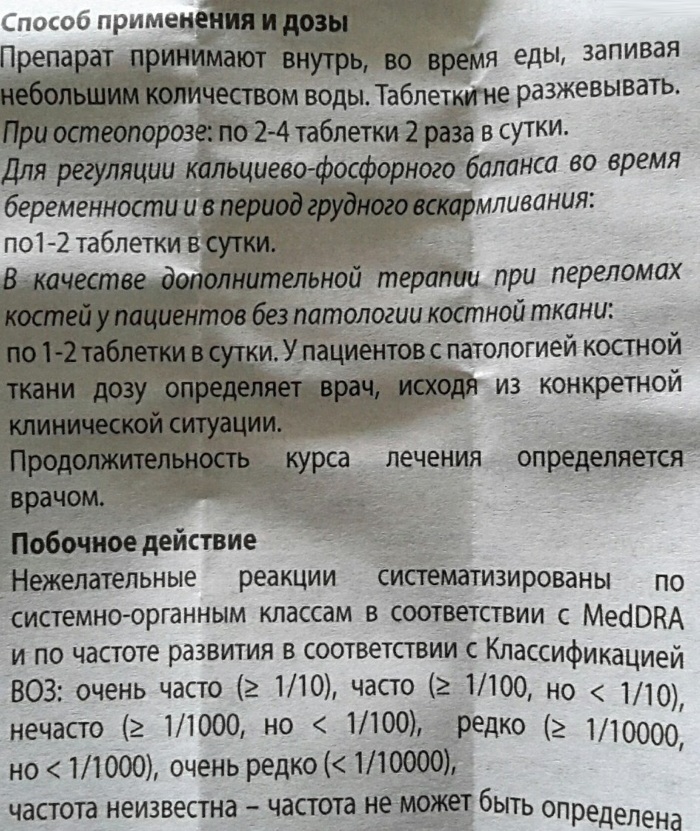Content
- Composition and form of release
- Terms of sale, prices
- Pharmacological properties
- Pharmacodynamics and pharmacokinetics
- Indications for use
- Contraindications
- Method of administration and dosage
- Elderly patients
- Primary dysmenorrhea
- Side effects
- Overdose
- special instructions
- Drug interactions
- Analogs
- Storage conditions
- Video about the drug Indomethacin
The drug Indomethacin relieves inflammation, lowers body temperature and relieves pain. The drug is available in the form of tablets, suppository and solution for intramuscular injection. Indications for use are diseases that are characterized by symptoms in the form of severe pain syndrome.
Composition and form of release
Round tablets, biconvex, covered with a white film shell.
1 tablet contains:
Active ingredient:
- indomethacin - 25 mg
| Additional substances | Content in mg |
| lactose mohydrate | 41,6 |
| seen | 25 |
| microcrystalline cellulose | 16 |
| potato starch | 10 |
| magnesium stearate | 0,9 |
| Shell components | Content in mg |
| acryl-EZE White 93А18597 | 3,6 |
| talc | 0,594 |
| titanium dioxide | 0,540 |
| triethyl citrate | 0,40 |
| sodium hydrogen carbonate | 0,036 |
| colloidal silicon dioxide | 0,036 |
| sodium liuryl sulfate | 0,018 |
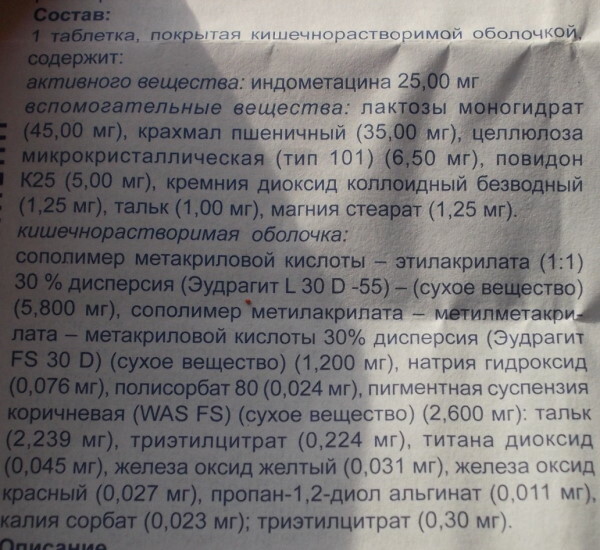 The drug is also available in the form of a solution for injections.
The drug is also available in the form of a solution for injections.
Terms of sale, prices
The medication is sold in pharmacy chains only with a prescription from the attending doctor.
The cost of Indomethacin in tablets and solution for injections varies from 50 to 200 rubles. depending on the volume of the package and the manufacturer.
Pharmacological properties
The active ingredient is a substance that is part of indoleacetic acid. The drug has a strong anti-inflammatory and analgesic effect, the mechanism of which is associated with the suppression of the production of prostaglandins, provoking a decrease in their amount in the blood. Prevents the interaction of tissue receptors with bradykinin, reducing pain in the inflammation focus. By inhibiting cyclooxygenase, it inhibits prostaglandin synthesis. Reduces the formation of blood clots in the area of inflammation.
The content in plasma reaches a maximum within 1-2 hours.
Pharmacodynamics and pharmacokinetics
Indomethacin has antiaggregatory, anti-inflammatory, febrifugal and analgesic effects. The tablets reduce platelet aggregation. The indication for use is severe painful sensations provoked by inflammation or infection. Reduces stiffness and swelling of the joints in the morning, reduces or completely relieves non-rheumatic pain and of a rheumatic nature, as well as swelling:
- in joints at rest or in motion;
- with inflammation after injury and surgery.
Bioavailability 80-90% when taken orally. Penetrates all tissues, systems and organs. By binding to blood plasma proteins in 90%, it enhances the medicinal effect of other medicines with simultaneous therapy.
The half-life of the active substance varies from 2.6 to 11 hours. The kidneys excrete 60-75%, of which 10-20% in its original form, the rest - with feces and bile.
Indications for use
Indomethacin tablets (indications for use are due to the medicinal properties of the active ingredient).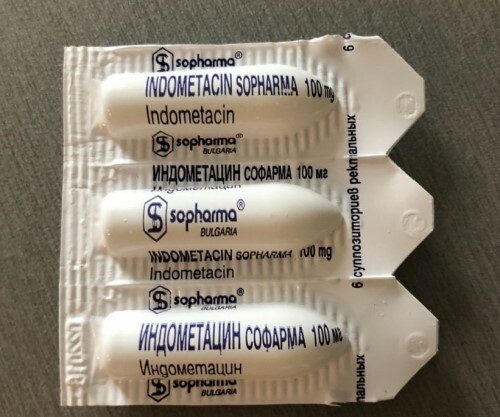
It is prescribed for short-term therapy of pain syndrome of a chronic course and during an exacerbation, accompanying the following conditions:
- pathology of the musculoskeletal system of an inflammatory nature;
- sports injuries;
- diseases of the tissues around the joints;
- inflammatory and infectious diseases of the ENT organs;
- discopathy, pathology of the nerve plexuses, neuritis.
The drug does not affect the development of pathology.
Indomethacin is not prescribed during gestation. The active substance is excreted in breast milk. During medication therapy, breastfeeding is stopped.
The use can negatively affect fertility, in this regard, it is not prescribed to women at the stage of pregnancy planning.
Contraindications
Indomethacin has contraindications.
These conditions include:
- attacks of rhinitis, respiratory failure, urticaria, provoked by taking aspirin;
- duodenal ulcer and stomach, intense bleeding in the digestive system;
- dysfunction of the heart;
- inflammatory bowel ailments;
- lactose intolerance;
- Congenital heart defect;
- recovery period after coronary artery bypass grafting;
- disorders of the functioning of the liver and kidneys;
- insufficient blood clotting;
- disorders of hematopoiesis;
- hyperkalemia;
- the patient's age is up to 14 years.
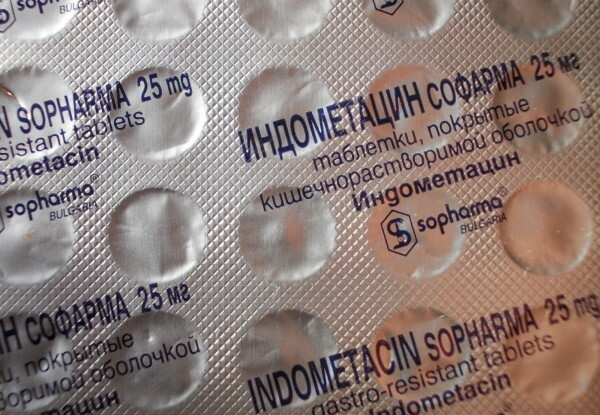
Assign carefully:
- cerebrovascular pathology;
- ischemia of the heart;
- hyper and dyslipidemia;
- disorders of the functions of the heart of a chronic course;
- diabetes;
- low platelet count;
- peripheral vascular disease;
- hypertension;
- smoking;
- cirrhosis of the liver;
- long-term use of NSAIDs;
- hyperbilirubinemia;
- alcohol abuse;
- severe somatic pathologies.
Method of administration and dosage
Indomethacin tablets (indications for use affect the dosage). The dose and duration of therapy is determined by a specialist for each patient individually, taking into account the general condition and course of the pathology.
The daily dose for adults is 1.5-2.5 mg / kg, the maximum is 150 mg.
Elderly patients
It is recommended to take 1 or 2 tablets throughout the day.
Primary dysmenorrhea
Take 1 tablet a day. The duration of therapy is 1-2 weeks. To reduce the likelihood of developing adverse reactions in the digestive system, the medication is recommended to be taken together with antacids during or after a meal, drinking plenty of water or milk.
With prolonged therapy, the dose per day should not be higher than 75 mg. It is strictly forbidden to combine with the use of alcoholic beverages.
Side effects
Indomethacin can provoke the development of the following adverse reactions:
| Systems and organs | Possible violations |
| Liver, digestive organs | The following symptoms may appear:
In rare cases, it may develop;
|
| Nervous system. | The following violations are possible:
Rarely:
|
| Genitourinary system | Isolated cases of occurrence:
|
| Hematopoiesis. | Rarely occur:
|
| The cardiovascular system. | Against the background of admission, you may experience:
|
| Skin and subcutaneous tissue | The following symptoms may appear:
|
| Hearing organs, vestibular apparatus | Sometimes there are:
|
| Orans of view | The following disorders may occur:
Long-term therapy causes:
|
| Immunity. | Sometimes there are:
|
| Metabolism. | The following reactions may occur:
|
| Respiratory system | There are:
|
| Connective tissue and musculoskeletal system | There may be:
|
Overdose
When taking an increased dose of the medication, migraine, nausea, dizziness, vomiting, disorientation in space, drowsiness, memory loss may occur.
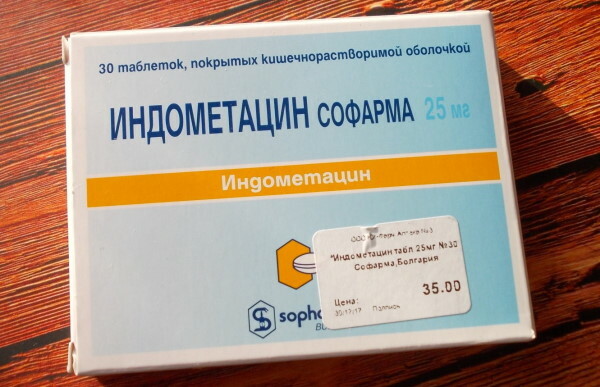
Symptomatic therapy is used to ensure the normal functioning of the body. It is recommended to induce vomiting and gastric lavage. Then take activated charcoal. If the condition worsens, hospitalization and supervision of specialists for several days is necessary.
special instructions
Indomethacin tablets (indications for use require compliance with certain instructions). Adverse reactions can be reduced by taking the lowest effective dose.
Negative manifestations from the liver and digestion are reduced if the medication is combined with food. Patients with severe pathologies of the stomach and intestines are recommended to start NSAID therapy with the lowest possible dosage.
Clinical trials have shown that the use of certain NSAIDs can cause arterial thrombotic events.
Assign with special care to patients with drug hypersensitivity. When symptoms of this disorder appear, the reception is stopped.
There is a likelihood of hyperkalemia, especially in elderly patients with disorders of kidney function, taking 3-blockers, ACE inhibitors and diuretics that save potassium.
Caution is indicated for patients with mental disorders, epilepsy, Parkinson's disease, disorders work of the heart of a chronic course, hypertension, hemorrhagic syndromes and an increased tendency to bleeding. Indomethacin provokes a violation of fluid withdrawal, therefore it is carefully used in therapy for patients with diseases that are characterized by the appearance of puffiness.
In patients with low blood flow, it can provoke the development of severe renal hypoglycemia. They need to control the functioning of the kidneys during drug therapy.
The medication can provoke bronchospasm, therefore, patients suffering from bronchial asthma are prescribed it with caution.
Taking indomethacin can cause visual impairment and retinal abnormalities, therefore, with prolonged use, it is necessary to regularly undergo examination by an ophthalmologist. In addition, it is recommended to periodically examine the blood, liver and stomach function in order to identify negative reactions at the initial stage of development.
It is recommended to use the medication with caution in patients after surgery, as it can increase the duration of bleeding.
The use of indomethacin reduces fertility. Reception is not recommended for women who are planning to conceive.
Patients with SWR and connective tissue pathologies significantly increase the likelihood of viral meningitis.
The medication contains lactose, therefore it is categorically contraindicated in patients with intolerance to this substance of a hereditary nature.
Negatively affects the speed of reactions when driving a car or working with potentially dangerous mechanisms. It is not recommended to take medication for drivers and people whose professional activities require increased attention.
Drug interactions
Indomethacin tablets (indications for use include the possibility of interaction with other medicines). It is strongly not recommended to take 2 or more NSAIDs due to the high likelihood of developing negative reactions.
| Medication | Possible consequences when taken together with indomethacin |
| Aspirin | Simultaneous reception is contraindicated. In addition to side effects, acetylsalicylic acid can lower the concentration of the active ingredient in plasma. |
| Antibacterial drugs | The likelihood of seizures is high. |
| Zalcitabine | Provokes changes in their pharmacodynamics. |
| Zidovudine | The likelihood of hematologic toxicity is high. |
| Ritonavir | The risk of indomethacin toxicity is significantly increased. |
| Cyclophosphamide | Use with caution, as there is a high likelihood of developing water intoxication. |
| Antidepressants | There is a high likelihood of bleeding. |
| Metformin | In rare cases, it can provoke metabolic acidosis. |
| Antiepileptic medicines | Use with caution. |
| Haloperidol | Increases drowsiness. |
| Indirect anticoagulants | Increases the effect of warfarin, and therefore, there is a need to control the prothrombin index. |
| Clopidogrel | There is a high likelihood of bleeding. |
| Probenecid | The content of indomethacin in the blood may increase, as a result of which a dose reduction is required. |
| Diuretics of different types | Indomethacin reduces the diuretic and antihypertensive effect. |
| Corticosteroids | Increases the likelihood of bleeding and ulceration in the digestive system. |
| Diflunisal | May cause bleeding in the stomach and intestines. |
| Tacrolimus | There is a high likelihood of developing nephrotoxicity. |
| Benzodiazepines | Dizziness may occur. |
| Mifepristone | Indomethacin is contraindicated for at least 8 days after taking this medication. |
| Muromonab-SBZ | The likelihood of psychosis and encephalopathy is high. |
| Vasodilator drugs | High risk of bleeding. |
| Quinolines | Increases the likelihood of seizures. |
 The active substance may show incorrect test results:
The active substance may show incorrect test results:
- increase the concentration of one or more liver enzymes;
- may give a falsely negative dexamethasone test result.
Analogs
Analogues in composition and therapeutic effect include the following drugs:
- Indomethacin: DS, Biosynthesis, Altpharm;
- Metindol
Storage conditions
The manufacturer recommends storing Indomethacin at a temperature not exceeding 25 C. Keep the tablets out of the reach of small children. The shelf life when the medication is indicated for use is 3 years. Taking an expired medication is categorically contraindicated.
Indomethacin indications for use:

